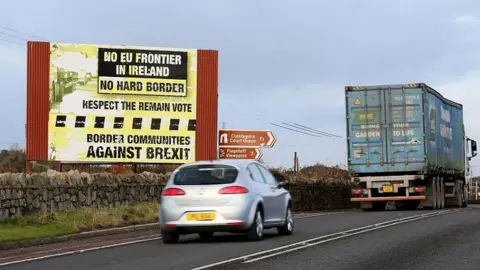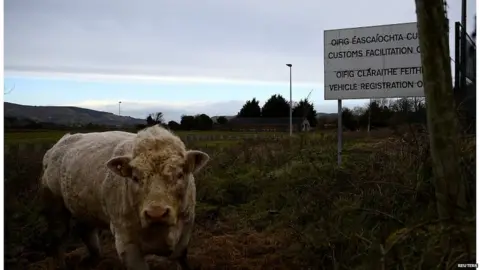Brexit: No 10 still 'confident' of Irish border solution
 AFP
AFPNo 10 says it is confident a deal can be done to avoid a hard border on the island of Ireland after Brexit despite signs of an impasse over the issue.
The BBC understands UK plans to resolve the matter faced sustained criticism from the EU at a meeting on Wednesday.
The UK wants to use technology to help goods flow freely and avoid regulatory alignment between the North and South.
Downing Street said it did not recognise reports it had been told none of its proposed ideas would work.
The EU wants to present an agreed solution on the issue to a summit meeting of European leaders in June.
Chief negotiator Michel Barnier told French TV on Friday that 25% of the final withdrawal deal had still to be settled and it could still be derailed by disagreements over the border and other issues.
Britain is due to leave the European Union on 29 March 2019.
December's first-phase agreement - officially known as the Joint Report - contains the "backstop" option of continued regulatory alignment between Northern Ireland and the Republic of Ireland in many areas.
The UK is strongly resisting this, as it believes this will effectively see Northern Ireland remain in the EU's customs union, which Theresa May is committed to leaving.
The UK hopes to avoid this outcome either by agreeing a very close economic partnership with the EU, which it believes would make physical checks on the Irish border unnecessary, or the use of technology to keep goods flowing freely as they do now.
 Reuters
ReutersThe BBC understands that at a meeting on Wednesday with top UK officials, the EU's deputy Brexit negotiator, Sabine Weyand, went through the UK proposals "line by line" and explained why from the EU side they had not changed sufficiently since previous negotiations and were still unacceptable.
An EU source said there would be more talks in the coming weeks and opportunities for the UK to come back with fresh proposals ahead of June's summit.
The Daily Telegraph said it had been told the UK's plans for Northern Ireland had been subject to a "systematic and forensic annihilation".
The paper also claimed that the UK was told it would have to ensure "full compliance" with EU rules on goods and agricultural products if it wanted to prevent customs barriers.
The BBC understands British officials do not take the same view of the meeting and point out that the EU has long been sceptical about the UK's position.
'Trickery'
Theresa May's official spokesman said the UK would continue to work with the EU to find a solution "that works for everyone involved".
"We are confident that in the coming months if all sides work together productively we can achieve a solution," he said.
"We have been clear that the UK is leaving the customs union and we need to find a solution that protects things like the Belfast agreement, avoids a hard border between Northern Ireland and the Republic of Ireland and protects Ireland's place in the UK internal market. That continues to be our focus."
Irish foreign minister Simon Coveney said both sides had made a series of commitments on the border but translating them into a legally binding agreement was proving "challenging".
"We're still looking for the same things we were looking for six, eight and twelve months ago, which is to protect the Good Friday Agreement, to make sure North-South co-operation works, and to make sure we have no physical border infrastructure on the island of Ireland."
Lack of progress on the issue would increase domestic pressure on Theresa May, who is facing growing calls within Parliament for the UK to remain in the EU's customs union - which ensures no internal tariffs between its members but prevents states from negotiating their own trade deals with other countries.
MPs are pushing for a vote in the Commons next week on remaining in some form of customs union after the government was defeated on the issue in the Lords on Wednesday.
One of those backing such a vote, Stella Creasy, a Labour MP speaking on behalf of anti-Brexit campaign People's Vote, said there was the risk of "enormous damage" to the peace process in Northern Ireland if Brexit was mishandled.
"No trickery is going to get Theresa May or her government out of the hole they have dug for themselves in ruling out continued membership of the customs union and the single market," she said.
